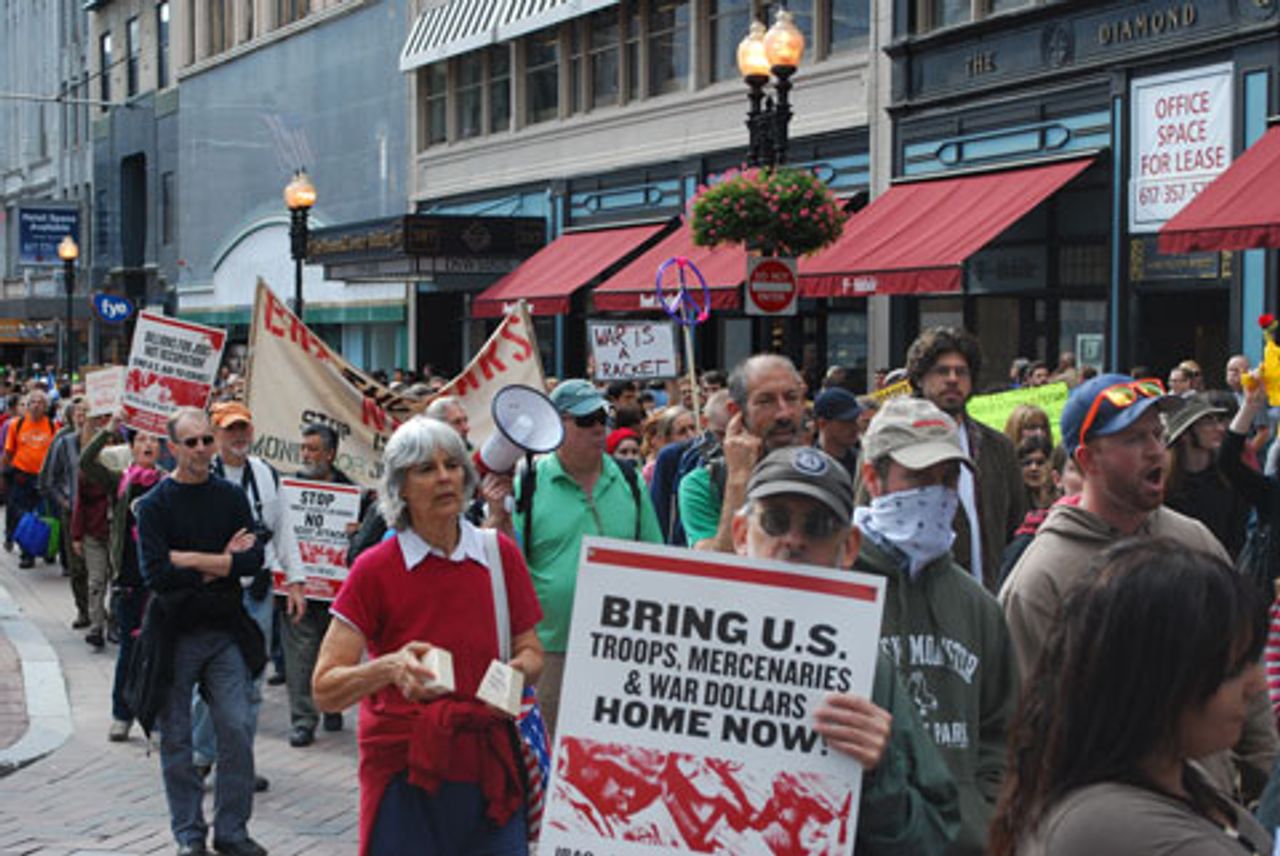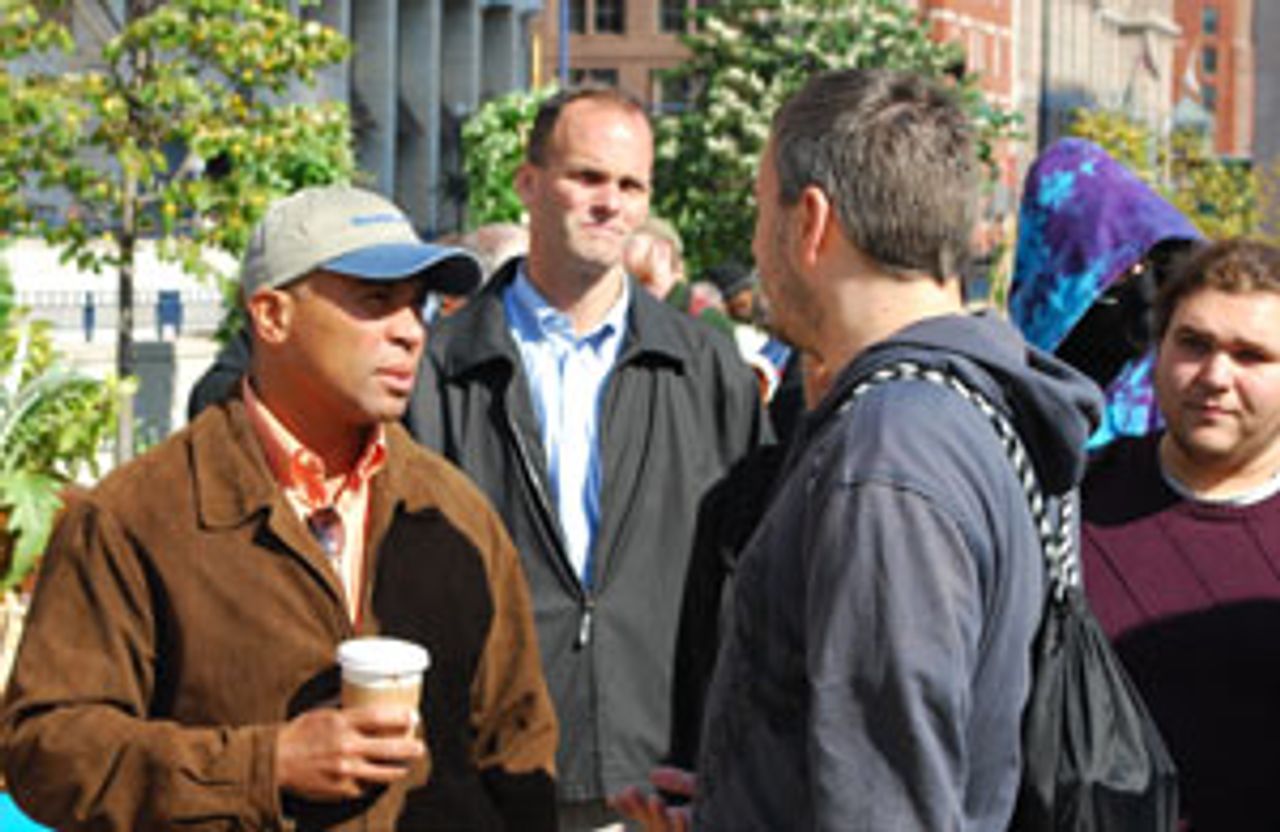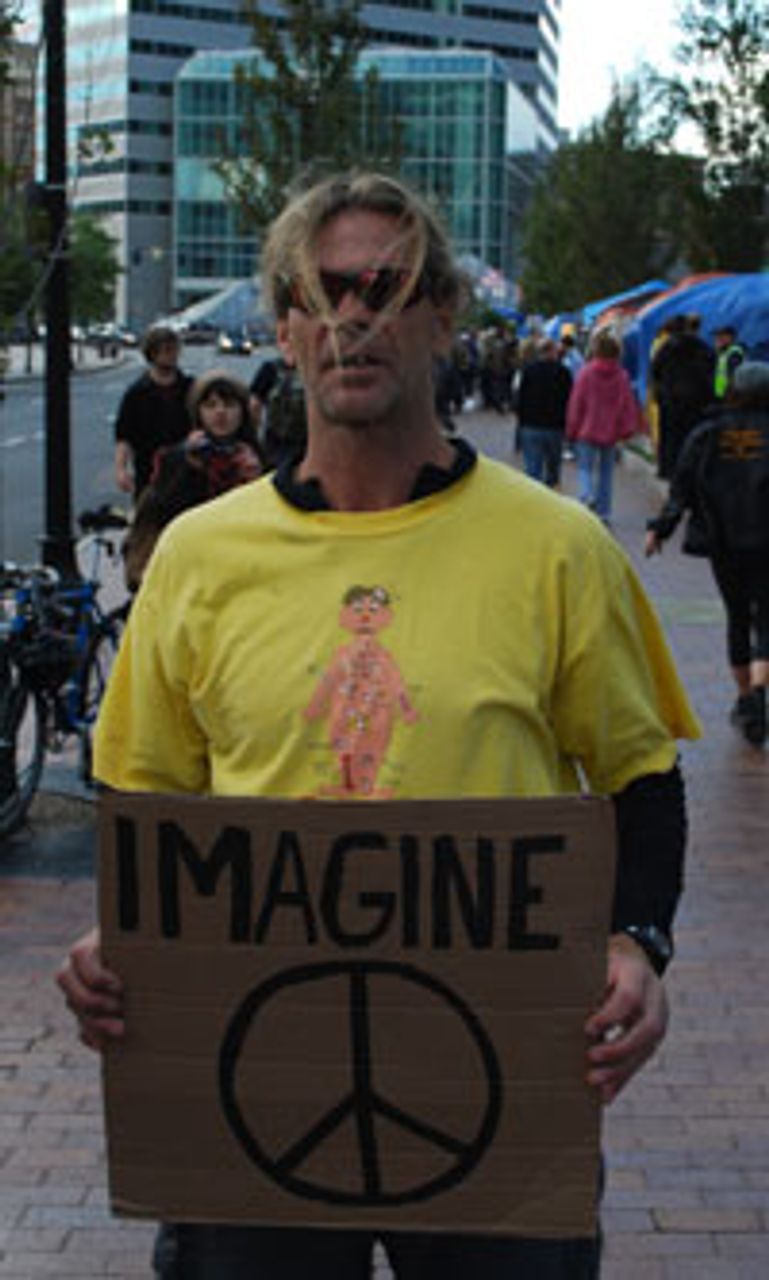Several thousand people marched through downtown Boston last Saturday afternoon as part of the October 15 Boston Antiwar Rally. Although not officially endorsed by Occupy Boston, many participants of the Boston protest joined in the march.
 March through downtown Boston last Saturday
March through downtown Boston last SaturdayOccupy Boston is part of a growing movement in solidarity with New York’s Occupy Wall Street, which has spread to hundreds of cities across the US and now internationally. The unifying thread of the protests is a deep-seated anger over the immense social inequality that is the dominant feature of social life today.
Just hours before the Boston march, Massachusetts Governor Deval Patrick visited the Occupy Boston site in Dewey Square. The Democratic governor apparently had called protest organizers and asked to be given a tour of the tent city, requesting that the media not be alerted of his plans. As it happened, reporters for the World Socialist Web Site were on hand to take note of Patrick’s visit.
Deval Patrick is a long-time Democratic Party politician, having served as an assistant attorney general in the Clinton administration. As Massachusetts governor he has presided over millions of dollars in budget cuts and attacked the jobs and benefits of state workers. He is a multimillionaire who has been seated on the boards of some of the biggest US corporations, or served as their legal counsel.
All of this, however, did not seem to faze the small group of Occupy Boston organizers who led the Massachusetts governor around the tent city grounds on Saturday. Patrick said he had come to gain a “better understanding” of the group and their protest, and was shown the site’s new library, media tent, food kitchen and living spaces. He nodded with approval and said he was impressed with the set-up, as he walked by signs reading: “We are the 99 percent” and “Down with corporatocracy.”
 Deval Patrick (left) speaking with Occupy Boston organizers
Deval Patrick (left) speaking with Occupy Boston organizersAs he spoke with the pre-selected Occupy Boston organizers, however, a number of protesters expressed their outrage with his being paraded through the grounds. A member of Veterans for Peace called out, “He’s part of the problem! I don’t know why they’re fawning over him.”
Boston teacher Garret Virchick interjected, “I asked the governor at a meeting if he would support a graduated income tax. What’s his position on that?” One of those chatting with Patrick turned around and told him to be quiet. Another protester was not deterred, shouting, “Deval Patrick is one of the 1 percent. Deval Patrick represents corporate America!” Someone else called out, “He has a $4 million house!”
Patrick took no visible notice of these comments, and continued his conversation with the group, asking various people why they had joined the protest. Some said they had lost their jobs, or were facing huge student loan debts, or were upset with policies of the banks and corporations.
One young organizer said he was glad the governor had come, commenting, “The role of elected officials is to see what we’re making of democracy and then support it. And I hope that you’ll do that.” This same individual informed the governor that some Occupy Boston protesters arrested the previous week still faced charges. “When you figure out where you stand on this,” the young man asked politely, “we’d like to know.”
Boston Police carried out a violent early morning raid on protesters October 11, arresting 147 and removing them from an area of the greenway where they had expanded their tent city. Patrick nodded, but offered no indication that he would intervene on their behalf.
When this reporter asked Patrick what responsibility the Democratic Party and Obama had for the conditions being protested by the Occupy movement, he snapped, “You’ll have to ask the Obama administration about that.”
As Patrick continued his walk through the campground he was followed by one protester, who repeatedly called out, “Deval Patrick has a $4 million house! Whoever has a $4 million dollar house, raise their hand!” Someone sitting on the sidelines as the governor and his small entourage walked by said, “A $4 million house? I don’t even have a $1 house—I don’t have a house!”
 Barry Knight
Barry KnightAfter Patrick and his team left the area, the WSWS spoke to Barry Knight, the protester outraged over Patrick’s $4 million home. He said he come up from Tennessee and had decided to stay on at Occupy Boston because he believed in the movement’s objectives. Commenting on the governor’s visit, Barry said, “He’s a perfect example of what is wrong. The fact that he’s trying to use this protest to his advantage is disgusting and morally corrupt.”
It is also extremely dangerous. The Democratic Party and its backers are engaged in a concerted effort to co-opt the Occupy movement to see to it that the protests do not lead to a broader struggle against the existing economic and political order. They seek to channel the anger felt by growing numbers of protesters into the reelection of Obama and other Democrats in 2012.
The fact that Occupy Boston organizers not only allowed Governor Patrick’s visit, but welcomed it as a positive step forward, should sound alarm bells among those protesters who are genuinely outraged over the policies of the ruling class that are plunging millions into destitution, and who want to do something about it.
In the spirit of “non-confrontation” and “no politics,” protest organizers are courting a representative of the ruling elite whose class interests are diametrically opposed to their own. A brief examination of Deval Patrick’s record bears this out.
After serving in the Clinton administration as assistant attorney general from 1994 to 1997, Patrick headed up a private law practice in Boston. He went on to work as general counsel for Texaco in New York City and Coca-Cola in Atlanta, defending these mammoth corporations against racial discrimination suits.
Objecting to Patrick’s visit to Occupy Boston, someone wrote on a discussion board on the group’s site, “Deval was on the board of directors for Ameriquest, one of the biggest contributor[s] to [the] housing bubble and a leader in predatory lending.” During Patrick’s tenure on the board of directors of the parent company of Ameriquest and Argent Mortgage, the two companies originated over $80 million in subprime mortgages.
Since his inauguration as Massachusetts governor in 2007, Deval Patrick has imposed deep cuts in social spending. For the fiscal year beginning July 2011, he signed a budget that includes $750 million in spending cuts, the largest year-over-year cut since the 1991 recession, including cuts to education, nutrition and other vital programs.
A law signed by Patrick clears the way for Massachusetts cities and towns to rip up existing health care agreements and force municipal workers into cheaper plans. An overhaul of the state’s pension system, pushed by the governor and approved by the Democratic Party-dominated state Senate, would push back the retirement age for public employees.
In the area of health care, Patrick and Democratic legislative leaders are currently working on a plan to replace the existing fee-for-service system with “global payments” to health care providers. Such a “cost-effective” system would inevitably result in rationed care for the majority of people, while preserving the profits of the giant private insurers.
The social and class interests of Deval Patrick and the Democratic Party have nothing in common with the struggles faced by those who have been moved to action in the current protests. The ruling class program of bank bailouts, budget cuts and war must be opposed with a political program based on the independent interests of the working class, and the fight for socialism.
